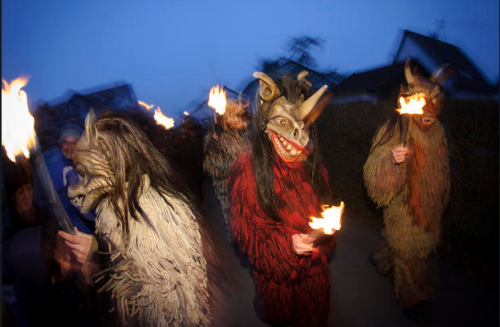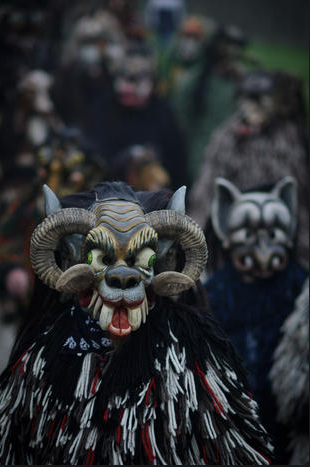copperbadge:clockways:petitepointplace:“ … the relative unimportance of things female in the Midwint
copperbadge:clockways:petitepointplace:“ … the relative unimportance of things female in the Midwinter antics shows us, in fact, the other side of the coin. This is the time of the male principle … For the crops (or babies) to grow, the earth (or female) must be inseminated by the male; and after insemination, one must wait awhile before seeing evidence of new life. Normally the new life appears in the fields in the spring, therefore the insemination must be ritually encouraged earlier–in the winter and/or at the time of plowing and sowing. … Note that all these maskers and mummers are traditionally men. When female personae are needed for enacting little dramas, men play the parts cross-dressed. This, of course, only adds to the general hilarity, and laughter, like dancing and jumping, was felt to promote life. Evidently male magical power, in the European agrarian traditions, is expressed through masking the men … . ”—-In Austria, on the three Thursday evenings before Christmas, masked youngsters went house to house making great noise with whips and cowbells, knocking on doors and windows to scare away the evil spirits, and crying out, “in with good luck, out with bad luck!” For this service they expected a reward of sweets or nuts. In Salzburg, according to an account around 1800, … masked youths, decorated with bells, leapt with the help of their staves over ditches and walls during their progress through the valleys at night. When their troop arrives noisily, the lights in the houses must be doused, “to keep the windows intact, and no one dares let himself be seen by them on the way who doesn’t want to subject himself to disagreeable encounters … Many of the disguised lads used their long staves for all kinds of jumping with a strength and agility seldom see amongst the greatest acrobats. One of the boys even touched the ceiling of the room with the soles of his feet.Tyrolean farmers views this prodigious jumping as crucial: if the “Perchten-runners” didn’t leap about enough in the fields, the crops would fail.… Jumping like dancing, promotes life. A gloss from a millenium ago already mentions Perchten night, often held on Twelfth Night, the Eve of Epiphany.—-Elizabeth Wayland Barber, The Dancing Goddesses@copperbadgeThis form of festival is one of my favourites, because it’s just so weird and wild and mysterious and it happens all over Europe in various iterations, from the Krampus to the bell-jumpers to mummers and carolers to straw bears and goats and demons of all kinds. It’s a central moment in my first novel, Nameless. Somehow this tiny midwestern town where the book is set managed to acquire a midwinter festival, and they carry on the Straw Bear tradition year after year. It’s an intricate ceremony with a lot of random moving parts and nobody explains it; it’s something you experience, and you bring your own understanding to it. These rituals are visceral and personal and specific to place, even though they are part of a wider cultural history. I placed one of these festivals at one of the turning points in the novel – this moment where one of the protagonists, as an avatar of a community, discovers how powerful elemental magic can be, and the other protagonist, the narrator, is forced to confront the fragility of his existence in front of the entire town. I think the most fun of the entire book was crafting the Straw Bear ritual. I’m not a summer sort of person, and never will be; give me a bonfire, a blizzard, and a creepy-ass midwinter festival any day of the week. -- source link








